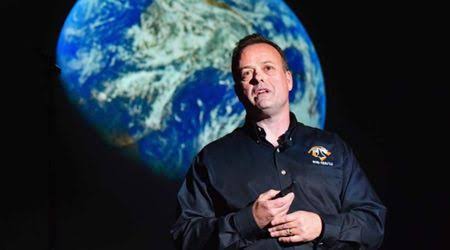After spending 178 days in space, former NASA astronaut Ron Garan had a profound realization that continues to shape his outlook on humanity’s role in protecting the planet. Reflecting on his career, during which he orbited Earth 2,842 times and traveled over 71 million miles, Garan shared an eye-opening perspective: humanity is “living a lie.”
This epiphany, he explains, is tied to what many astronauts describe as the “overview effect.” The phenomenon, experienced by those who have gazed upon Earth from space, can evoke a deep sense of interconnectedness and a transformative awareness of the planet’s fragility. For Garan, the experience led to a sobering conclusion about the state of human priorities and our relationship with the Earth.
In an interview with Big Think, Garan recalled the awe-inspiring moments he witnessed from his vantage point in orbit. “I saw the paparazzi-like flashes of lightning storms,” he described. “I saw dancing curtains of auroras that seemed so close it was as if we could reach out and touch them. And I saw the unbelievable thinness of our planet’s atmosphere.”
It was the sight of this “paper-thin” atmospheric layer—the barrier that sustains all life on Earth—that struck him deeply. Garan described it as a moment of clarity: “I was hit with the sobering realization that that paper-thin layer keeps every living thing on our planet alive.”
However, what Garan did not see from space was just as impactful as what he did. He didn’t see national borders, political systems, or the global economy. Instead, he saw “an iridescent biosphere teeming with life.” This stark contrast between Earth’s natural beauty and humanity’s artificial constructs led him to a powerful conclusion: our current systems are fundamentally flawed.
“Our human-made systems treat everything, including the very life-support systems of our planet, as the wholly owned subsidiary of the global economy,” Garan said. “It’s obvious from the vantage point of space that we’re living a lie.”
Garan isn’t the first astronaut to experience the overview effect. Edgar Mitchell, an Apollo 14 astronaut, once described the sensation as an “explosion of awareness.” According to BBC Sky at Night magazine, this effect often leads to spiritual awakenings or a strengthened emotional connection to the planet. For Garan, it was an awakening that not only highlighted the fragility of Earth but also deepened his sense of unity with all its inhabitants.
He elaborated on this profound sense of connection in a separate interview with Forbes: “Being completely detached from Earth also made me feel deeply connected with everyone on the planet. It was this overwhelming kinship.”
Since returning to Earth, Garan has channeled his insights into action, becoming a passionate advocate for environmental sustainability and social equity. Recognizing the urgency of reorienting humanity’s priorities, he has called for a shift from profit-driven systems to ones that prioritize the health of the planet and its inhabitants.
To further this mission, Garan founded the Manna Energy Foundation, a nonprofit organization focused on providing access to clean drinking water in developing nations. He also launched the Fragile Oasis initiative, a platform dedicated to fostering global collaboration and positive change. Through these efforts, Garan aims to inspire others to view Earth not as a collection of competing nations but as a shared home that demands collective care.
Garan’s message is particularly relevant as humanity continues to expand its presence in space. While technological advancements allow us to reach for the stars, Garan emphasizes the importance of applying the lessons learned in orbit to life on Earth. “The view from space makes it clear that we’re all in this together,” he noted. “If we don’t prioritize the health of our planet, there won’t be much left to sustain future generations.”
His call to action resonates beyond the realm of science and exploration. It’s a reminder that Earth’s fragile beauty, as seen from space, is a gift worth preserving. By shifting our focus from short-term economic gains to long-term environmental stewardship, Garan believes we can ensure a thriving future for both the planet and its inhabitants.
In an era marked by climate change and geopolitical tensions, Garan’s reflections serve as a powerful wake-up call. The perspective he gained from space underscores an essential truth: the survival of humanity is intricately tied to the well-being of Earth. Only by recognizing and addressing this interdependence can we hope to achieve a sustainable and harmonious existence.
As Garan’s journey illustrates, the most valuable discoveries from space are not just technological advancements or scientific breakthroughs but the profound insights they offer about our place in the universe—and our responsibility to protect the planet we call home.














2 thoughts on “Astronaut Reflects on 178 Days in Space, and Becomes a Passionate Advocate for Stewardship of the Planet”
Here,here!Yeah,so stop with the wars of terrorism and everyone love one another and look after what we have?? Honestly humans better get their Act together Fast,and stop blowing humans Up
We have to work as one in unity..No one is better than another..We all have a part to play,and get rid of the joker’s in our deck of cards